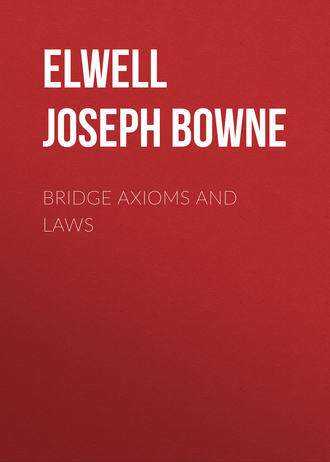 полная версия
полная версияBridge Axioms and Laws
a To ask the dealer whether he has none of the suit in which he may have renounced.
b To ask the dealer when called upon to play his highest or lowest card whether he has conformed to the penalty.
c To call the dealer's attention to the fact that a trick has not been completed.
d To correct the claim of either adversary to a penalty to which the latter is not entitled.
e To call attention to the fact that a trick has been erroneously taken by either side.
f To participate in the discussion of any disputed question of fact which may arise between the dealer and either adversary.
g To correct an erroneous score.

Should the dealer's partner call attention to any other incident of the play, in consequence of which any penalty might be exacted, the fact of his so doing precludes the dealer exacting such penalty.

If the dealer's partner, by touching a card or otherwise, suggest the play of a card from dummy, either of the adversaries may, but without consultation, call upon the dealer to play or not to play the card suggested.

Dummy is not liable to the penalty for a revoke; and if he should revoke and the error be not discovered until the trick is turned and quitted, the trick stands good.

A card from the dealer's hand is not played until actually quitted; but should the dealer name or touch a card from the dummy hand, such card is considered as played, unless the dealer in touching the card or cards says, "I arrange," or words to that effect.

If, after the deal has been completed and before the trump declaration has been made, either the dealer or his partner expose a card from his hand, the eldest hand may, without consulting with his partner, claim a new deal.
If, after the deal has been completed and before a card is led, any player shall expose a card, his partner shall forfeit any right to double or re-double which he otherwise would have been entitled to exercise; and in case of a card being so exposed by the leader's partner, the dealer may either call the card or require the leader not to lead the suit of the exposed card.

All cards exposed by the dealer's adversaries are liable to be called, and such cards must be left face upward on the table.

The following are exposed cards:
1st. Two or more cards played at once.
2d. Any card dropped with its face upward, or in any way exposed on or above the table, even though snatched up so quickly that no one can name it.
3d. Every card so held by a player that his partner can see any portion of its face.

A card dropped on the floor or elsewhere below the table is not an exposed card.

If two or more cards be played at once, by either of the dealer's adversaries, the dealer shall have the right to call which one he pleases to the current trick, and the other card or cards shall remain face upward on the table and may be called at any time.

If, without waiting for his partner to play, either of the dealer's adversaries should play on the table the best card, or lead one which is a winning card, as against the dealer and dummy, or should continue (without waiting for his partner to play) to lead several such cards, the dealer may demand that the partner of the player in fault win, if he can, the first, or any other of these tricks, and the other cards thus improperly played are exposed cards.

If either or both of the dealer's adversaries throw his or their cards on the table face upwards, such cards are exposed and are liable to be called; but if either adversary retain his hand he cannot be forced to abandon it. If, however, the dealer should say, "I have the rest," or any other words indicating that the remaining tricks are his, the adversaries of the dealer are not liable to have any of their cards called should they expose them, believing the dealer's claim to be true, should it subsequently prove false.

If a player who has rendered himself liable to have the highest or lowest of a suit called fail to play as directed, or if, when called on to lead one suit, lead another, having in his hand one or more cards of the suit demanded, or, if called upon to win or lose a trick, fail to do so when he can, he is liable to the penalty for revoke, unless such play be corrected before the trick is turned and quitted.

If either of the dealer's adversaries lead out of turn, the dealer may call the card erroneously led, or may call a suit when it is the turn of either adversary to lead.

If the dealer lead out of turn, either from his own hand or dummy, he incurs no penalty; but he may not rectify the error after the second hand has played.

If any player lead out of turn and the other three follow him, the trick is complete and the error cannot be rectified; but if only the second, or second and third, play to the false lead, their cards may be taken back; there is no penalty against anyone except the original offender, who, if he be one of the dealer's adversaries, may be penalised as provided above.

In no case can a player be compelled to play a card which would oblige him to revoke.

The call of an exposed card may be repeated at every trick until such card has been played.

If a player called on to lead a suit have none of it, the penalty is paid.
CARDS PLAYED IN ERRORShould the third hand not have played and the fourth play before his partner, the latter (not being dummy or dealer) may be called upon to play his highest or lowest card of the suit played, or to win or lose the trick.

If anyone, not being dummy, omit playing to a former trick and such error be not corrected until he has played to the next, the adversaries may claim a new deal; should they decide that the deal stands good, the surplus card at the end of the hand is considered to have been played to the imperfect trick, but does not constitute a revoke therein.
If anyone (except dummy) play two cards to the same trick, or mix a card with a trick to which it does not belong, and the mistake be not discovered until the hand is played out, he is answerable for any consequent revokes he may have made. If during the play of the hand the error be detected, the tricks may be counted face downward, in order to ascertain whether there be among them a card too many; should this be the case, the trick which contains a surplus card may be examined and the card restored to its original holder, who (not being dummy) shall be liable for any revoke he may meanwhile have made.
THE REVOKEA revoke occurs when a player (other than dummy), holding one or more cards of the suit led, plays a card of a different suit. The penalty for a revoke takes precedence of all other counts.

A revoke is established if the trick in which it occurs be turned and quitted, i. e., the hand removed from the trick after it has been gathered and placed face downward on the table; or if either the revoking player or his partner, whether in his right turn or otherwise, have led or played to the following trick.

The penalty for a revoke is three tricks taken from the revoking player and added to those of the adversaries.

The penalty is applicable only to the score of the game in which it occurs.

Under no circumstances can the revoking side score game, in that hand. Whatever their previous score may have been, the side revoking cannot attain a higher score toward game than twenty-eight.

A player may ask his partner whether he has not a card of the suit which he has renounced; should the question be asked before the trick is turned and quitted, subsequent turning and quitting does not establish a revoke, and the error may be corrected unless the question be answered in the negative or unless the revoking player or his partner has led or played to the following trick.

If a player correct his mistake in time to save a revoke, any player or players who have followed him may withdraw their cards and substitute others, and the cards so withdrawn are not exposed cards. If the player in fault be one of the dealer's adversaries, the card played in error is an exposed card, and the dealer can call it whenever he pleases; or he may require the offender to play his highest or lowest card of the suit to the trick in which he has renounced.
If the player in fault be the dealer, the eldest hand may require him to play the highest or lowest card of the suit in which he has renounced, provided both adversaries of the dealer have played to the current trick; but this penalty cannot be exacted against the dealer when he is fourth in hand, nor can it be enforced at all from dummy.

At the end of a hand the claimants of a revoke may search all the tricks. If the cards have been mixed the claim may be urged and proved if possible; but no proof is necessary, and the revoke is established if, after it has been claimed, the accused player or his partner mix the cards before they have been sufficiently examined by the adversaries.

A revoke must be claimed before the cards have been cut for the following deal.

Should the players on both sides subject themselves to the revoke penalty neither can win the game by that hand.

The revoke penalty may be claimed for as many revokes as occur during a hand; but the accumulated penalty shall in no event exceed thirteen tricks.

There should not be any consultation between partners as to the enforcement of penalties. If they do so consult, the penalty is paid.

Once a trick is complete, turned, and quitted, it must not be looked at until the end of the hand.

Any player during the play of a trick, or after the four cards are played and before they are touched for the purpose of gathering them together, may demand that the cards be placed before their respective players.

If either of the dealer's adversaries, prior to his partner's playing, should call attention to the trick, either by saying it is his, or, without being requested so to do, by naming his card or drawing it toward him, the dealer may require that opponent's partner to play his highest or lowest card of the suit led, or to win or lose the trick.

Either of the dealer's adversaries may call his partner's attention to the fact that he is about to lead out of turn, but if he make any unauthorised reference to any incident of the play the dealer may call a suit from the adversary whose turn it is next to lead.

In all cases where a penalty has been incurred, the offender is bound to give reasonable time for the decision of his adversaries; but if a wrong penalty be demanded none can be enforced.

The partner of the eldest hand may inform him that their adversaries have incurred a penalty, but may not give any further information. Should he suggest the penalty, or demand the enforcement of it, such action shall be deemed a consultation, and no penalty can be enforced.

Unless a pack be imperfect, no player shall have the right to call for one new pack. If fresh cards are demanded, two packs must be furnished and paid for by the player who has demanded them. If they are furnished during a rubber, the adversaries shall have their choice of new cards. If it is the beginning of a new rubber, the dealer, whether he or one of his adversaries be the party calling for the new cards, shall have the choice. New cards must be called for before the pack is cut for a new deal.

A card or cards torn or marked must be replaced by agreement or new cards furnished.

While a bystander, by agreement among the players, may decide any question, yet he must on no account say anything unless appealed to; and if he make any remark which calls attention to an oversight affecting the score, or to the exaction of a penalty, he is liable to be called on by the players to pay the stakes on that rubber.
SPADE CONVENTIONI. – Where players agree "not to play spades" the rule is, that if the spade make is not doubled, the hand shall be played where either side is 20 or over.
II. – If the third hand player ask, "Shall I play?" or should he lead out of turn, or should the eldest hand lead without asking permission to play, the spade maker may take two on the score or may call a lead and require the hand to be played out.
III. – Should the third hand player double before his partner asks permission to play, the spade maker may decide whether the double shall stand or not; but the hand must be played out.
ETIQUETTEIt has been truthfully said that there is no game in which slight intimations can convey so much information as that of Bridge. In justice to those who, by their manner, give information, it may be stated that most of the apparent unfairness at the Bridge table is unintentional. Hesitation and mannerisms, however, cannot be too carefully avoided; such a breach of etiquette is an offence for which the adversaries have no redress except perhaps a refusal to continue the play.

It is obviously a greater fault to take advantage of information thus given. A play in your judgment may be perfectly sound, but you leave yourself open to criticism if it is in any way contingent on information obtained from your partner's manner.

Cultivate uniformity in your style of play; let there be no remarkable haste or hesitation in making or passing; try always to use the same formula of words, and do not call attention to the score after the cards have been dealt.

Remember that any undue hesitancy in regard to doubling will deprive a fair-minded partner of the privilege of so doing. Such delays are too frequent at spade declarations.
Emphasise no play of your own and show no pleasure or displeasure at any other play.

Do not ask to have the cards placed unless it is solely for your own information.

It is an offence either to revoke purposely or to make a second revoke in order to conceal the first.

The dealer's partner should not call attention to the score nor to any card or cards that he or the other players hold, and neither should he leave his seat for the purpose of watching his partner's play.
THE DECLARATION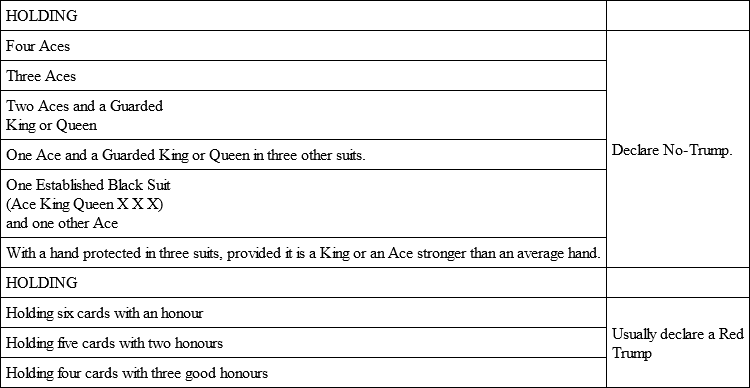
Avoid a weak diamond make at a love score or when behind on the game.

Declare clubs at a score of 18 or more when reasonably assured of the game.

Declare spades at a score of 24 or more when reasonably assured of the game.

Be cautious about declaring no-trumps when weak in the red suits.

Avoid all weak red makes on partner's pass.
Declare clubs instead of spades when you hold but one or two spades and a club suit of four or more cards including two honours.

Declare your best suit at a score of 24 all on the rubber game.
ORIGINAL LEADS AGAINST A DECLARED TRUMP
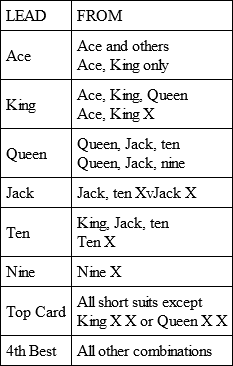
X indicates others.
THE ORIGINAL LEAD AT NO-TRUMP
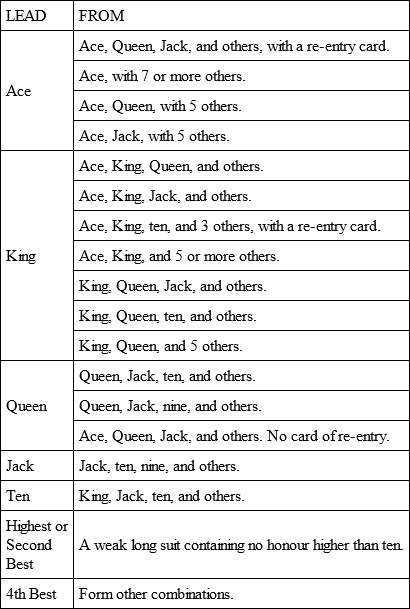
UNBLOCKING AT NO-TRUMP
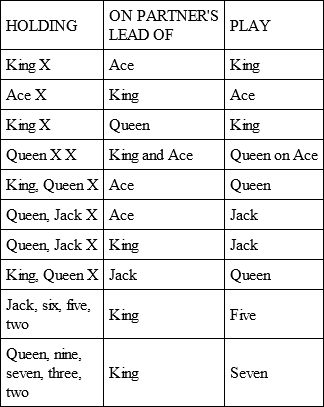
"What is new in the game of Bridge?" is a reiterated question of the day, and the invariable answer is "Nothing, nor does the lack of innovation tend to simplify the play."

All Bridge players have experienced the agony of being forced to discard a great suit, thoroughly established, on the dealer's lead, owing to the fact that the partner has made two efforts to establish the suit he originally opened.

Many times this continuation is sound: the leader holds a re-entry card, and he has secured no information as to his partner's strength from the early development of the game.

It is essential to good play that the dealer's adversaries should each gain definite knowledge of the others' holding. Any information that a play can convey is of inestimable help to them and of little or no benefit to the dealer, who is the master of his own two hands.

We all sympathise with that constantly uttered regret, "Oh, partner, if I had only known that you had that suit," and Bridge players the world over have felt the need of some conventional play that would indicate to the original leader an adequate reason for a change of suit.

The Change the Suit Call is a new convention designed to overcome this difficulty, one that will save countless tricks and rubbers, and one that will tend to minimise the dealer's acknowledged advantage in playing the two hands.

The convention is as follows: When the original leader's partner has a great suit, one that is established or one that may be established by a single lead through the dummy hand, an echo should be made in the suit led by the dealer. In other words, an echo in the adversary's suit is a command to the original leader to abandon his own unestablished suit and to switch to his partner's declared strength.

The idea is of course based on the call for trumps in Whist, in which game an echo in any plain suit is a command to the partner to lead trumps. In Bridge it is used principally at no-trump and its application is limited to an echo on the dealer's lead.

The reader will naturally ask, "How, when but two suits have been led, can I determine which of the two remaining to choose?" The cards in the leader's hand combined with those in the dummy will usually simplify the selection. Should the leader hold a re-entry in one of the remaining suits it is obvious that he has been asked to lead the other. When it happens that both the leader and the dummy are weak in both suits, the preference should usually be given to the one in which the combined hands contain the fewer number of cards.

